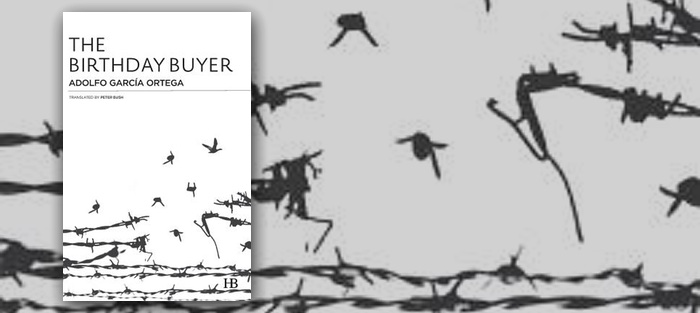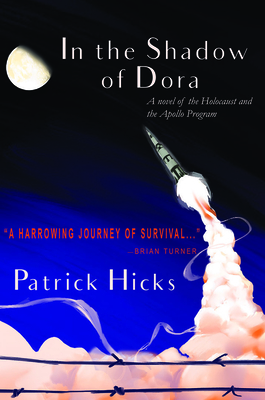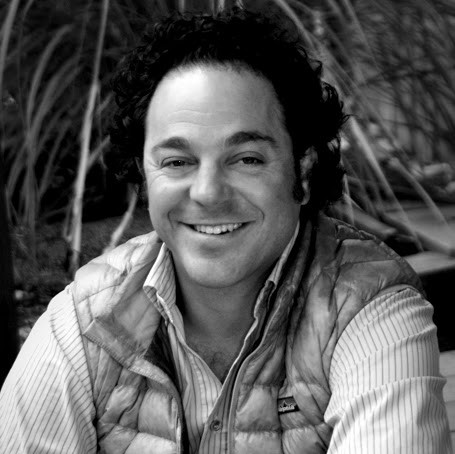This assignment began as a review of Peter Bush’s translation from the Spanish of Adolfo García Ortega’s 2002 novel, The Birthday Buyer (El Comprador de Aniversarios). The translation was published at the end of 2013 by Madrid-based Hispabooks, which was founded in 2011 and describes itself as “a brand new publishing house focusing on contemporary Spanish fiction in English-language translation, both in eBook and trade paperback format, targeting readers around the world who want to explore the best of today’s Spanish literature.”
Hispabooks sent their first catalogue to Jeremiah Chamberlin, the Editor-in-Chief of Fiction Writers Review. Jeremiah thought I might be interested in reviewing a Spanish Holocaust novel, of which The Birthday Buyer is one (of maybe four Holocaust novels written by Spaniards total). The Hispabooks catalogue describes it as “a poignant story, or rather, a series of stories, set in Auschwitz.” The longer description lower down the catalogue page goes on to explain that Ortega’s novel stems from several sentences in Primo Levi’s The Reawakening about a three-year-old boy, Hurbinek, who was born and died in Auschwitz, and about whom Levi wrote and the catalogue quoted, “Nothing remains of him; he bears witness through these words of mine.”
I was intrigued. Primo Levi, the attempt to tell an untellable story, a Spanish Holocaust novel, how could I not be intrigued? I was also frustrated at having to write about translations without access to the original language, as I had done with my essay “Slouching Past Totality: Or, What a Post-Modern Holocaust Novel Might Be,” which began as a review of Gleichmann’s Elixir of Immortality. So, I asked my friend and colleague, Dr. Hayden Carrón, director of Spanish language studies at High Point University, if he’d like to collaborate on this review-turned-conversation. I’m glad that I did. In an American context, Ortega’s novel is odd; in the context of Holocaust novels it’s odder still.
The Birthday Buyer is the first-person, present-tense narrative of an unnamed narrator (this itself is a move seemingly designed to echo W.G. Sebald’s narrators). The narration begins with the enigmatic line “Auschwitz is too close.” Oddly, for me, this opening immediately sets the book in a contemporary period, and, indeed it is. The narrator, after a lifetime of fascination with the Holocaust has set off from Spain to Auschwitz that he might:
Probe the reasons behind that massacre, that annihilation, to find out who the guilty parts were, to ascertain the historical truth.
Because he “wanted to know the details…” saying:
I felt I was Jewish, Russian or any of the victims of persecution, humiliation and elimination, human beings crushed and erased simply because they existed. Murdered because they existed. Murdered because they existed. I felt like a victim, any one of those victims. And of those victims, Hurbinek perhaps was most victim of all.
The narrator, though, is not Jewish, nor is he (or Ortega) in any way a victim of the Holocaust. That he “felt” Jewish paired with the stylistic exuberance of the passage gives the passage a fetishistic tone. It is no surprise, then, that in an inversion of the Holocaust trope of naming the geniuses killed by the Nazis, he focuses on the person he considers most victimized. Fetish, though, has a very different concern with historical accuracy than does, say, the machinations of justice or historical writing. Fetish seeks accuracy in order to indulge in immersion, and to this end, the desire for details makes a lot of sense.
Too close to Auschwitz turns out to be a hospital bed in Frankfurt where the narrator lands after an automobile accident involving a truck driver. Literally hobbled—his leg broken—the narrator recuperates just proximate enough to Auschwitz to be tended to by a blond German doctor, allowing him to revel in conjecture about the doctor’s Nazi-ness. Thus immobilized in a kind of pre-consummative tizzy, the narrator imagines his way, in graphic detail through the Holocaust’s horrors—the torture and killing of children fills twenty pages—and then through imagined lives Hurbinek might have had, had he survived.
Certainly, this isn’t the first narrative to desire the Holocaust in some fashion. Still, I couldn’t help but wonder at why this book exists, at what desire its fetish satisfies, and what purpose it served to subject myself to The Birthday Buyer’s retelling of familiar horrors, now rendered in exuberant prose. This is where my conversation with Hayden began:
Jacob Paul: I was surprised to see a contemporary Holocaust novel coming out of Spain. While I certainly recognize some of the moves Ortega makes from the larger canon of contemporary Holocaust literature, such as the specific invocation of an elided space, namely that of the potential life Hurbinek doesn’t live, the emphasis on subjectivity invoked by the unnamed first-person narrator, and the ready references to other Holocaust authors, all of which generally serve to point at the un-narratable nature of unspeakable horror, it occurred to me that I don’t have any sense of a Spanish tradition of the Holocaust novel.
Hayden Carrón: For good reason: there hasn’t traditionally been one, because, as everyone knows, historically, the relationship of Spain with its Jews has been problematic.
What Jews?
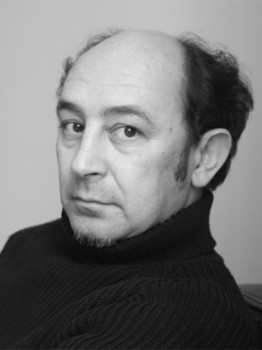
Adolfa García Ortega
Exactly. Spain expelled its Jews after the Reconquista at the end of the fifteenth century and their imaginary remnants for the following three hundred years with The Inquisition. However, there’s been a specific disconnect between the rest of the world and Spain’s traditional accounting of twentieth-century, European history. Spain’s largely elides the Holocaust. For example, Primo Levi’s work, which Ortega uses as a starting point for The Birthday Buyer, wasn’t published in Spanish until 1987. Of Levi’s generation of Holocaust authors, only Eli Wiesel was translated into Spanish earlier, and even that wasn’t until 1971. Jean Amery was first published in Spain in the 1990s. It wasn’t until 1997 that the first novel by a Spanish author that dealt with the Holocaust was published, El violín de Auschwitz, by the Catalan author Maria Àngels Anflada.
I guess in some ways, that doesn’t entirely surprise me given Spain’s insulation from WWII, lack of a Jewish population, and isolationist policies during the Franco regime. I’m also not surprised that Wiesel would be translated first. He is, after all, the one who won a Nobel, and he’s easiest to read in some ways. Of the three you’ve mentioned, his narrative tends to be the most redemptive. Night is offset by Day, his account of participating in Israel’s rebellion against Britain; and he’s unique in that his ghosts didn’t win, in the sense that he didn’t commit suicide. What, though, about the European literature that must have been translated into Spanish, such as Edmund Jabes?
I’m not sure of the extent to which those guys like Jabes were available to Spanish letters, but certainly it wasn’t a directly significant influence, at least in terms of the Holocaust itself, because no one wrote about the Holocaust. In part that’s because Spanish authors were simply uninterested in Jews, Judaism, et cetera. This lack of interest remains true, both about Jews and the Holocaust, so much so that the Spanish inherently assume that if one brings up the topic of the Holocaust, one only does so out of an apologetics for Israel’s relationship with the Palestinians.
But apathy is only part of the cause. Franco’s regime was pro-Hitler: without the Luftwaffe, Franco would not have been able to defeat the Republicans during the civil war. In return, the Blue Brigade, of 18,000 volunteers, fought for the Nazis on the eastern front in Russia. Bringing up the Holocaust ran the risk of also bringing up that relationship.
Worse still, at the beginning of the civil war, Franco’s forces premised their actions in part upon the notion that they were defending the Castilian culture, consolidated and codified in 1492 with the expulsion of non-Catholics and discovery of the new world, which they claimed was “under threat by communists, Jews, and Masons.”
But we established that there weren’t any Jews in Spain!
An international conspiracy!
OK!
However, before WWII had even ended, Franco’s regime realized that the Axis powers were likely to fall, and made moves to align themselves with the Allies in order to assure their future survival. One of the ways they did this was to create a narrative that persisted until the 1980s in which Angel Sanz Briz, the Spanish Ambassador to Hungary in Budapest, rescued thousands of Sephardic Jews by offering them Spanish passports that they might escape to Spain.
What happened in the 1980s?
The truth came out. Sanz Briz’s actions weren’t sanctioned by the Franco regime; in fact, what he did was punishable. And so, once the regime realized that this rogue ambassador was doing this, they made it much harder for Jews to get in. However, the narrative allowed the regime to distance itself from the Axis powers by positioning itself as pro-Jewish, or at least not pro-Holocaust, and Sanz Briz enjoyed a long career as part of the regime.
When you say that the Spanish assume that the Holocaust is only brought up as an apologetics for Israeli action against the Palestinians, I assume that this implies an anti-Palestinian stance amongst some portion of the Spanish population. Is this true? And if so, what lies behind it?
There’s only an ignorance about the Jews’ stance. The right and the left both use the story of the Holocaust as a manner of exploring the horrors of the civil war, and the Franco dictatorship. The dictatorship has never actually been denounced. In fact, depending on the source, the Franco regime is treated as a necessary precursor to the democracy. In this way the regime becomes sacrosanct. So, the only way left available to examine the horrors of the civil war, or the behavior of the regime, is to find a proxy source of horrors that is safe to explore, examine, and interrogate. Namely, the Holocaust.
But I thought that Spanish letters elided the Holocaust altogether?
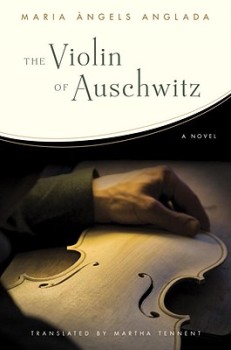 Spanish letters did elide the Holocaust, right up until Maria Àngels Anflada’s 1997 El violín de Auschwitz. Her novel opened the door to the possibility of exploring the Holocaust for Spanish writers. In the 2000s, Herman Tectsch, Fernando Marías, Antonio Muñoz Molina, and Adolfo García Ortega—all of them: these are people who have no personal connection to the Holocaust; they’ve learned about it through books and movies, and are repackaging it for the Spanish reader. There’s no emotional implication for the writer or reader, but an opportunity to talk about horrors. A common trope is to not only have a comprehensive knowledge of the topic, but to also use its key figures—folks like Primo Levi, Jean Amery, Walter Benjamin, etc.—as characters.
Spanish letters did elide the Holocaust, right up until Maria Àngels Anflada’s 1997 El violín de Auschwitz. Her novel opened the door to the possibility of exploring the Holocaust for Spanish writers. In the 2000s, Herman Tectsch, Fernando Marías, Antonio Muñoz Molina, and Adolfo García Ortega—all of them: these are people who have no personal connection to the Holocaust; they’ve learned about it through books and movies, and are repackaging it for the Spanish reader. There’s no emotional implication for the writer or reader, but an opportunity to talk about horrors. A common trope is to not only have a comprehensive knowledge of the topic, but to also use its key figures—folks like Primo Levi, Jean Amery, Walter Benjamin, etc.—as characters.
But the primary goal is to show the Spanish reader the horrors and tragedy. The easiest way to understand this fascination is to view the Holocaust in these works as an allegory for the civil war.
In the 2000s there were a wave of Holocaust novels in Spain. The scholar Marije Hristova in Memoria Pestada: El Holocausto en la Novela Espanola Contemporanea claims that Molina’s 2001 novel Sefarad and The Birthday Buyer are attempts to understand the repression during the dictatorship through allegory.
Exploration and catharsis, then? Catharsis in that the reader can learn how to contend with the emotional response in the safe space of fiction without impinging upon the sacrosanct, if potentially horrific, implications of the civil war and Franco regime, whose calling into question, it seems, is viewed as a threat to civil society.
I think that’s right. And how else does one explain Ortega’s ongoing fascination with politically motivated, sensational acts of violence? His other novels include El Mapa de la Vida (2009), about the 2004 terrorist bombings in Madrid, and Pasajero K (2012), about Bosnia Herzegovina.
Hristova claims that the word Hurbinek mutters in The Birthday Buyer, a word that is assumed to be “Hurbinek” and thus his name, through its unintelligibility, points at the impossibility of actually narrating the Holocaust.
Yes, but here, that impossibility is taken as license rather than humility.
License as regards the Holocaust, yes. But that license is a way of pointing at something even further outside the possibility of narration. In the 1980s, after Franco’s death, a domestic mythology was built up around what came to be called “The Spanish Example.” Spain viewed itself as the nation of the greatest people because it was able to peacefully transition to democracy. As part of that mythology, Franco’s regime was viewed as a necessary precursor to democracy. Spanish textbooks call it authoritarian rather than dictatorial, or, at their most severe, a “light dictatorship.” As a condition of peaceful transition, it was agreed that former members of the regime would not be prosecuted. However, by the 1990s it became clear that this was a way of the same people staying power under other titles, and that this was actually an amnesty and the literature began to echo that sentiment. Still, while the horrors of the civil war itself were explored, those of the regime remained, and remain, off limits.
In support of the allegorical reading, on page 15 in the English version, the unnamed, first-person narrator writes: “over the years, I decided I wanted to probe the reasons behind that massacre, that annihilation, to find out who the guilty parties were and who the victims were, to ascertain the historical truth.” This is strange because it’d be rare to think about the Holocaust, certainly from the standpoint of 2002, as an event whose guilty parties and victims were in any way unknown, and furthermore, because the book’s ambitions seem, later on, to often be an attempt to escape historic truth by inventing and imaging the life of this three-year-old who we know, with some real certainty, is dead.
By contrast, the period of repression during the Franco regime does exist as a period whose guilty parties and victims are outside of historic record. Though, of course, the suggestion that they need to be discovered holds out the possibility that the guilty are not necessarily the members of the regime.
I agree. It’s unclear why this narrator has this obsession with the Holocaust. This narrator has a number of encounters with information about the Holocaust, that section on page 15, the book by Primo Levi, et cetera, but none of it feels internalized to the character in a way that makes reasonable or believable his obsession and consequent journey to Germany.
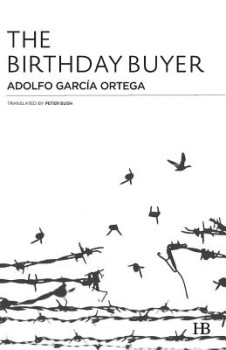 Yes, it seems like all of this is really an excuse to provide us with the list of horrors that begins on page 99 when Ortega writes that “to kill a child is easy, to kill thousands of children even easier,” and then proceeds to describe in detail for the following twenty pages the many ways in which children were killed during the Holocaust. He finds in that section a counterpart for his narrator in Erika Fisherkant, whose foundation is dedicated to unearthing the truth about these murdered children and who states of herself: “I am a German woman and have always been suspicious of that version that removed blame” (103).
Yes, it seems like all of this is really an excuse to provide us with the list of horrors that begins on page 99 when Ortega writes that “to kill a child is easy, to kill thousands of children even easier,” and then proceeds to describe in detail for the following twenty pages the many ways in which children were killed during the Holocaust. He finds in that section a counterpart for his narrator in Erika Fisherkant, whose foundation is dedicated to unearthing the truth about these murdered children and who states of herself: “I am a German woman and have always been suspicious of that version that removed blame” (103).
This sentence seems more directed at Spain than Germany. But the list of horrors is so indulgent and so over the top: it contemplates at length how many German soldiers might have received transfusions of blood from Jewish children while at Stalingrad, a kind of inversion of the Blood Libel. And, of course, that long series of imagined futures for Hurbinek afterwards could be read as a way of excusing that climax of horrors. On the other hand, that the narrator is literally kneecapped on his way to Auschwitz again seems to tell us that the answers lie not there, but in the narrator’s origins.
One of the primary justifications given for these novels, both Sefarad and The Birthday Buyer, is that they are means of educating a Spanish audience largely unaware of these historical figures and events that are otherwise well known in Europe. Both books are obsessed with Primo Levi. Neither of the novels provide a connection back to the Spanish consciousness, however, and so they’re relating an imagined understanding of the Holocaust as understood through other literature and films, and so the only recourse they have to create an emotional effect is to catalogue the horrors such that the reader is forced to have a response. However, because of the decontextualization, the reader gets the sense that the perpetrators aren’t even people: the acts seemingly consist solely of victims.
Yes, I also felt that way when I read the narrator’s antipathy towards the doctor in Frankfurt who treats him. It seems clear that the reader is not to take him as a Nazi, and that therefore the narrator’s postulations are seemingly about mythical creatures who manifest only as the odd Mengele.
Let’s not forget, too, that there were Spanish victims in the Holocaust, but that these aren’t the subjects of any of these novels. Spain sent its gypsies and its post-civil war political prisoners to concentration camps. Jorge Semprun, for example, wrote an autobiographical novel about surviving the Holocaust, but did so in French, from France, where he stayed until Franco’s death.
That’s awfully convenient! Have the Nazis kill off your enemies, and then later, when you look at the Holocaust, not acknowledge that you might have culpability.
The scholar Maartee Steenmeijer proposed that the 1990s were when the fascination with the national trauma reached the point that a surrogate investigation became necessary. Remember that Ortega looks at lots of horrors.
Perhaps that’s why Ortega’s novel seems so obsessed with exceptionalism. It’s not just Hurbinek, but Sofia, a character who appears on page 172 solely for the purpose of, in death, “having an astonishingly sweet composure…as if, at the moment of death, she had been courageous enough to think of something beautiful.” This isn’t the description of a dead Holocaust victim, but of a Catholic saint. Ortega, by emphasizing the exceptional victim, creates a class of unheralded martyrs, and these martyrs, it would seem, are those whose sacrifice must remain unvoiced that Spanish civil society might persist.
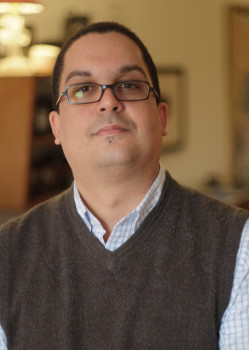 Dr. Hayden Carrón is an Assistant Professor of Spanish at High Point University, North Carolina. He received his MA. and Ph.D in Caribbean and Spanish Literature and Culture from the Universidad Autónoma de Madrid, Spain. He specializes in Caribbean literature and culture, particularly the Hispanic Caribbean and Haiti. He regularly presents in conferences about these topics. His articles include “La nación como tragedia: el pensamiento identitario dominicano en el siglo XIX” published in the Colorado Review of Hispanic Studies; and Borrando la huella africana: la sentencia 168-13 del Tribunal Consitucional Dominicano y la identidad nacional” published in the Afro-Hispanic Review.
Dr. Hayden Carrón is an Assistant Professor of Spanish at High Point University, North Carolina. He received his MA. and Ph.D in Caribbean and Spanish Literature and Culture from the Universidad Autónoma de Madrid, Spain. He specializes in Caribbean literature and culture, particularly the Hispanic Caribbean and Haiti. He regularly presents in conferences about these topics. His articles include “La nación como tragedia: el pensamiento identitario dominicano en el siglo XIX” published in the Colorado Review of Hispanic Studies; and Borrando la huella africana: la sentencia 168-13 del Tribunal Consitucional Dominicano y la identidad nacional” published in the Afro-Hispanic Review.

